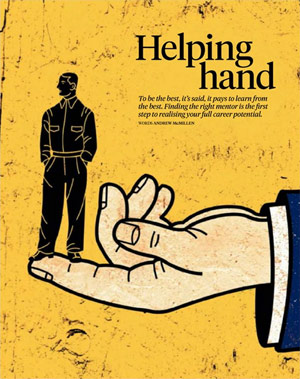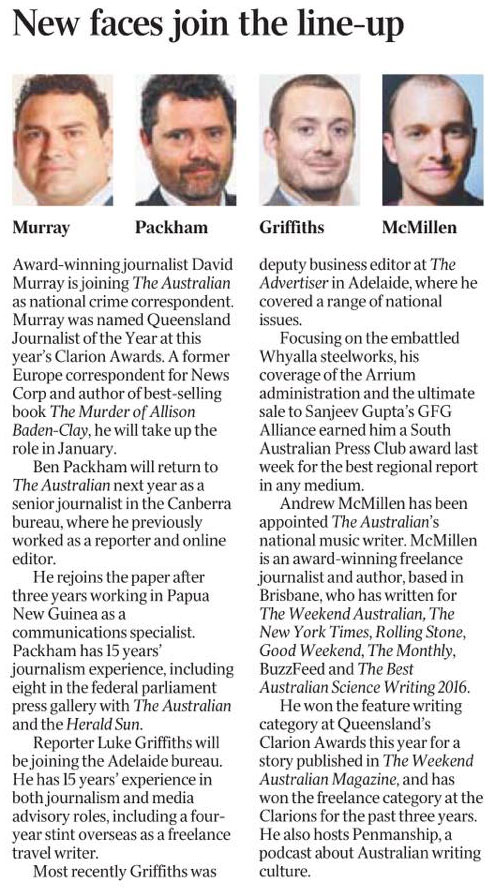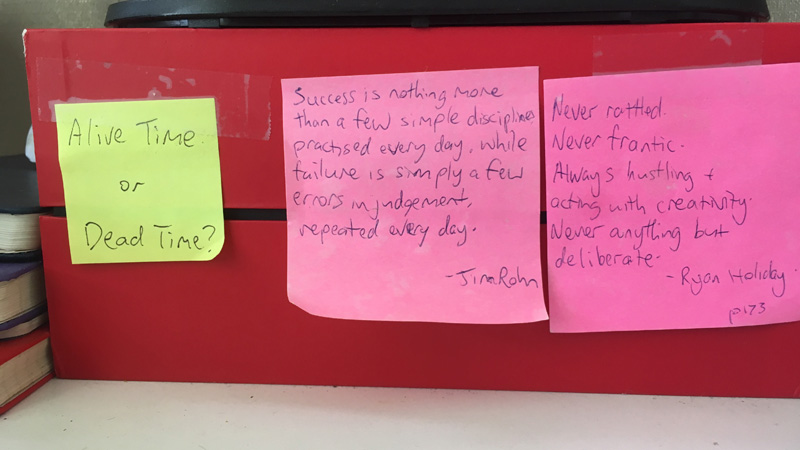Helping Hand
To be the best, it’s said, it pays to learn from the best. Finding the right mentor is the first step to realising your full career potential.
 There’s a lot to be said for one-on-one mentoring relationships, as great things can grow from even the simplest alliances. Sometimes, this is literally the case: Alexander The Great received private tuition from the Greek philosopher Aristotle, who taught his 13 year-old student about practical matters such as medicine, logic, and art, but also concepts such as self-control, honour and discipline. Clearly, Aristotle’s pupil benefited greatly from this relationship: by the age of thirty, he had created one of the largest empires in ancient history. Though that distinct master-apprentice relationship may not apply in all business scenarios, the broader concept of mentoring is certainly alive and well in Australia in 2013.
There’s a lot to be said for one-on-one mentoring relationships, as great things can grow from even the simplest alliances. Sometimes, this is literally the case: Alexander The Great received private tuition from the Greek philosopher Aristotle, who taught his 13 year-old student about practical matters such as medicine, logic, and art, but also concepts such as self-control, honour and discipline. Clearly, Aristotle’s pupil benefited greatly from this relationship: by the age of thirty, he had created one of the largest empires in ancient history. Though that distinct master-apprentice relationship may not apply in all business scenarios, the broader concept of mentoring is certainly alive and well in Australia in 2013.
“Great mentors push you to the edges,” says Wendy McCarthy AO. “They make you find that you could do things you’d never dreamt of. Great mentors do that for you; that’s the magic of mentoring.” McCarthy, who founded McCarthy Mentoring in Sydney in 1998, is also an experienced company director, and currently chairs Headspace National Youth Mental Health Foundation, Circus Oz, McGrath Estate Agents and Pacific Friends of the Global Fund. McCarthy’s daughter, Sophie, came on board at McCarthy Mentoring in 2007 as general manager, and the pair now arranges mentoring programs with senior executives, corporations, emerging leaders and individuals located in Australia, the UK, China and New Zealand.
McCarthy‘s experiences with the power of mentoring relationships began in her first career, before entering the business world. “I was the beneficiary of organic mentoring, certainly, even as a very young teacher at a girls’ school. There were older women in the staff room who took it upon themselves to help me find my way around – people whose wisdom I wanted to listen to, who were always there for support and advice.” This is an example of what she deems ‘organic mentoring’, which tends to grow in the workplace, beginning with a tap on the shoulder. “Someone senior sees someone junior, and thinks, ‘I’ll see what I can do for that person,’” Wendy explains. “It’s always a generous thing.”
The alternative is ‘formal mentoring’. “It’s quite different: it’s more structured, and it reaches a much wider group of people, because it’s not just self-selecting,” Wendy says. In such situations, “a CEO might look at how to develop high-potential people and how to have a diverse, inclusive culture,” she says. “It makes you look at people in a different way. It’s a reward program; it’s not just somebody tapping you on the shoulder. There’s a place for that, but nothing beats the formal discipline of meeting with someone for 20 hours a year, or 2 hours a month, to talk about and clarify their plans and what they’d like to be; and to be validated, in many ways.”
According to David Gonski, businessman and philanthropist, striking up a mentoring relationship is a very professional thing to do on the part of the mentor. As for the mentee, Gonski believes that it’s an “incredibly courageous and correct thing to do, because you’re investing time in thinking about yourself – which, often, one doesn’t do.” The simple fact that a mentee must open up completely, warts and all, before the earnt wisdom and experience of a senior figure is a significant gesture. “And of course you don’t know what the mentor will say to you. Sometimes it can be quite confronting,” he admits. “It takes a lot of guts to work under someone in your own profession.”
Gonski is a fine position to ruminate on his experiences on both sides of the mentorship coin. Although he currently chairs the boards of Investec, the Australian Stock Exchange and Coca-Cola Amatil, among others, he first became aware of the virtues of being mentored around the age of 22, when he began training at the law firm Freehills. Gonski calls his master solicitor and first mentor, the late Justice Kim Santow a saint. He taught Gonski not only how to be a good solicitor, but how to be a good person. Santow was enthusiastic about displaying a generosity of spirit in the community as a whole; by sitting in his office, Gonski learned “by osmosis” how Santow ran his life, his practice, as well as the way he looked at the world.
Ever since that first, fortuitous mentorship, Gonski has felt indebted to Santow, and has sought to give back what he got from the experience by mentoring others as often as possible. “If you can give somebody assistance, and see them succeed, it is fantastic. It is almost as good as seeing a child succeeding,” he says. Gonski says that many of his mentees are “much, much better than me, and it is absolutely wonderful to see them – as they say in the movies – ‘going for gold’.”
One of Gonski’s mentees is Ilana Atlas, a former group executive at Westpac. The pair was introduced through a mentoring program overseen by the Australian Institute of Company Directors in 2010. Although the program stipulated that the two were to have hour-long meetings every second month, Atlas says she was delighted to find Gonski was readily available outside of these if she wanted to talk through any issues. “For someone who has his obligations, I was frankly amazed that he was always accessible to me,” she says.
When queried on this, Gonski smiles and says he has a theory whereby, if someone asks him go to the ballet, he’s “extremely busy. But if you want me to go to a play, I’m available.” He recalls that, as a younger man, he was extraordinarily busy; at the time, mentorship was an extra to a very full-time load. Today, however, he views mentorship as part of his load, rather than an extra.
To get the most out of such an arrangement, Atlas, who serves as a non-executive director on Coca-Cola Amatil’s board, believes that the two most important ingredients are respect and trust. For the relationship to be successful, there needs to be mutual respect. “There also needs to be clarity about what you want to achieve, and clear rules so that each party understands what to expect from the relationship.”
McCarthy believes that internally operated mentoring programs have a low success rate. “Internal mentoring programs often fall apart,” she says, “even if they’re formally constructed, because the two people walk past each other in the workplace and make apologies; ‘Oh, I’m sorry we didn’t make our meeting last month. We must catch up.’ Quite often, it loses its intensity. My experience is that internal mentoring programs tend to be more effective when they’re organic; if they’re short, sharp and crisp, and across portfolios.”
Career consultant Katie Roberts advises her clients that, when seeking a mentor within their company, it’s important to look beyond their immediate managers. “It’s unusual for someone to have their boss, or their manager, as their mentor,” Roberts says. “I’d recommend that they go for someone at a higher level, who can be a little bit more objective in the advice they give; someone who is not directly impacted by the decisions they make.”
Roberts has operated her career consultancy since 2002, and has provided services for more than 10,000 individuals and organisations. “Mentorships work best in competitive industries, where there’s a lot of people vying for the same role. For people who are not given a clearly defined career development program within their company, mentoring relationships can help give them some solid steps that will help them move forward in their company and their industry,” she says. “As the job market becomes more competitive, it’s more and more important for people to look for mentors to help them out.”



 To me Australian journalist Andrew McMillen is without a doubt a success. His work has been published in/for Rolling Stone Australia, The Weekend Australian, QWeekend, Mess + Noise, The Vine, Triple J Mag, The Courier-Mail, Australian Penthouse, Gamespot, BrisbaneTimes.com.au and Junior. Andrew has managed to make freelance journalism in Australia pay the bills, not an easy task! Here Andrew and I discuss interviewing, challenges facing freelance journalists in Australia, his career goals and aspirations as well an insight into how he’s made writing a full-time gig. I give you a chat with two writers that deeply care about their craft…
To me Australian journalist Andrew McMillen is without a doubt a success. His work has been published in/for Rolling Stone Australia, The Weekend Australian, QWeekend, Mess + Noise, The Vine, Triple J Mag, The Courier-Mail, Australian Penthouse, Gamespot, BrisbaneTimes.com.au and Junior. Andrew has managed to make freelance journalism in Australia pay the bills, not an easy task! Here Andrew and I discuss interviewing, challenges facing freelance journalists in Australia, his career goals and aspirations as well an insight into how he’s made writing a full-time gig. I give you a chat with two writers that deeply care about their craft…